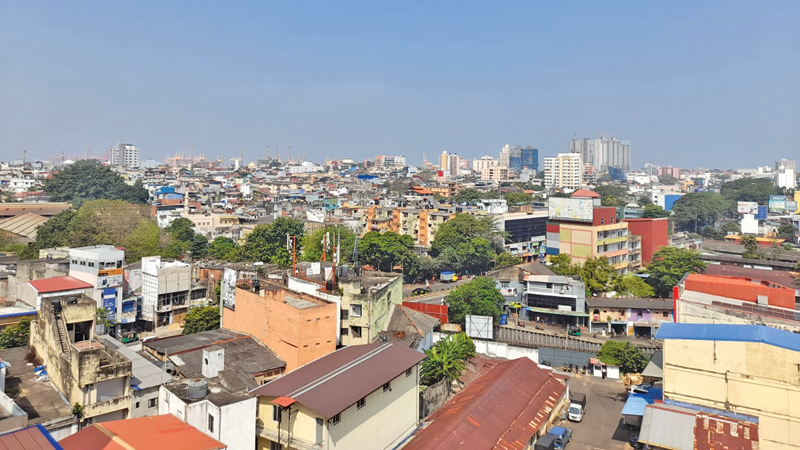Writing on urban planners and their visions for the future, the urban sociologist Richard Sennet said, “Instead of assuming that changes in the social structure of the city should be accomplished first in order to change the physical appearance of the city,” planning ideology is dominated by the notion that “it is somehow better, and certainly easier, to change the physical landscape in order to alter the social patterns of the metropolis.”
Such thinking has also pervaded attitudes towards housing and urban development in post-war Sri Lanka. The Urban Regeneration Project (URP), which has sought to relocate Colombo’s urban poor to high-rise apartments, proposed that the urban poor would gain social mobility and even improve marriage prospects with high-rise living.
There was considerably less interest in the social realities of the urban poor, what ruptures relocation might cause and how these social patterns may shape their interaction with the built environment, thus influencing the outcome of the whole housing project. Policies, like urban plans, contain visions for the future as well as blueprints for how society should function.
A new national housing policy is much needed to address the new patterns of a changing population, but it should be grounded in reality and guided by a desire to secure the right to housing of citizens.
Empirical reality
Evidence-based housing policy should be rooted in empirical reality, rather than assumptions that we share the problems of the global South and must implement the solutions of the global North. For instance, surveys have shown that Colombo does not have sprawling slums – a majority of the urban poor live in settlements with fewer than 20 houses, with secure tenure, permanent housing and metered electricity and water.
Ignoring this data is troubling as housing policy cannot deliver unless it understands who is most in need of housing, rather than who is residing on the most lucrative land. While the dire state of housing rights in the estate sector among the Malaiyaha community has been extensively documented, the state has failed to prioritise their needs.
This would also be an opportunity to identify new trends that housing policy must respond to, particularly in the context of the economic crisis and its impact. The unaffordability of middle-class housing, growing rental sector, suburbanisation, the impact of tourism on affordability are all trends that need to be studied before policy can respond to them.
The social reality of the user to be housed is also a crucial piece of evidence-based policy making. Beyond socio-economic data, research into the everyday lives, cultural expectations of home and place and even aspirations of communities and families can play a huge role in designing contextually relevant policies and programs.
The droves of relocated households fleeing the high-rise apartments they were relocated to, serves as a reminder that housing policy should also encompass dwelling and living in the built environment. A house is more than a ‘machine for living’, it is a way of expressing culture and identity, as well as accessing education, health, privacy and autonomy – international human rights law considers cultural adequacy as a key component of the right to adequate housing.
Financial feasibility is often represented in housing policy visions in the form of a hypothetical investor lured in by the prospect of liberated lucrative land.
Given the immense fiscal cost that is largely borne by the taxpayer as debt is taken on to fund housing projects, housing policy would do well to engage with the current economic reality rather than the imagined future, particularly in the context of countless other initiatives to attract investors.
There may be instances where scrutiny of the social and financial reality shows that there is no housing need to be addressed. Consider that 97% of settlements in Colombo have access to metered electricity as a result of Greater Colombo Water and Wastewater Management Improvement Investment Program.
Double burden
This project involved considerable state effort but it was also funded through a USD 92.67 million loan from the Asian Development Bank. Relocating households with adequate infrastructure to new housing that must also be financed places an unnecessary double burden on the Government and thus the taxpayer. (For a detailed analysis of the financial cost of the Urban Regeneration Program see Sunday Observer dated March 31, 2025). Second, the objective of housing policy should be to uphold the citizen’s right to housing. Housing should be about improving the citizen’s quality of life rather than rationalising land use and freeing up land for investment. This would also enable the citizen to be a partner in any housing initiative, with consultation woven into every stage to ensure suitability and thus sustainability, rather than a boxticking exercise that has no meaningful bearing on the project.
This participatory approach was pioneered by the Million Houses Program in the 1980s, where planners and government officials not only listened to the poor but changed building codes and guidelines to meet their needs. As a result we have the personnel, materials and tools to revive this culture of planning and recalibrate what consultation can mean.
We would also do well to think of housing beyond the narrow scope of development, but as a way of achieving equity and dignity.
For housing policy to have a truly transformative and sustainable result it is crucial that it is based in embracing reality and society as it is now rather than inventing perfect plans. Sri Lanka already has decades of experience with implementing participatory and people-centric housing. A new housing policy can and should be grounded in desire to ensure the right to housing rather than a physical manifestation of development.
The writer is a Research Associate at Colombo Urban Lab of the Centre for a Smart Future (CSF). This article is based on a recently published report titled ‘Built on Sand: A Review of the Urban Regeneration Project’ which is available on the CSF website www.csf-asia.-org.






